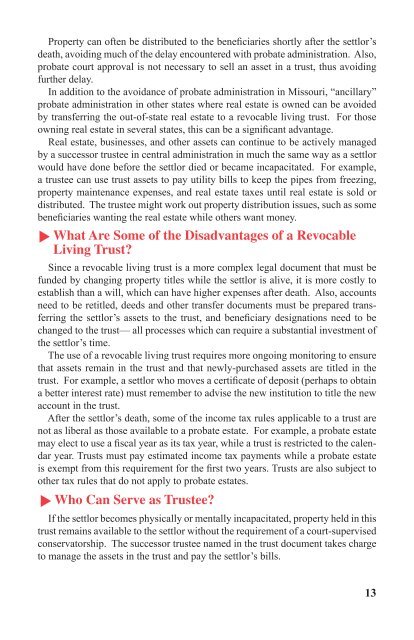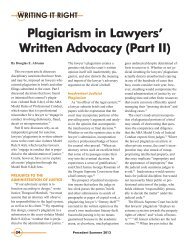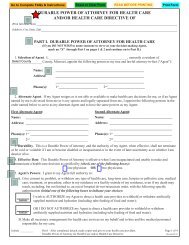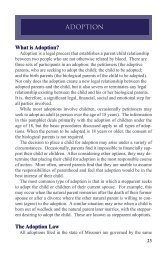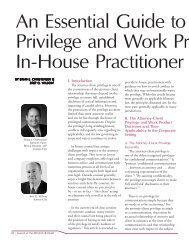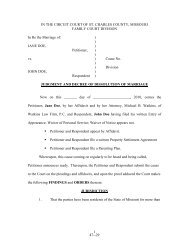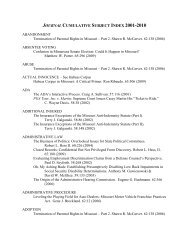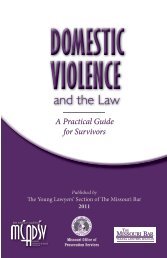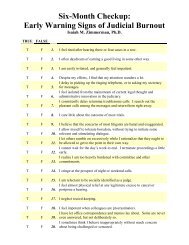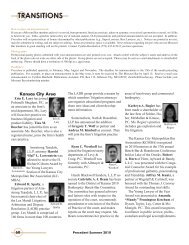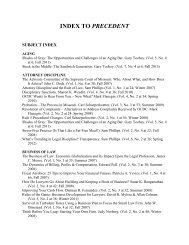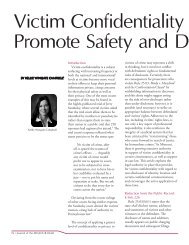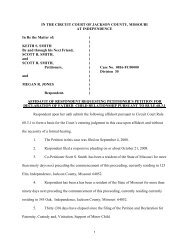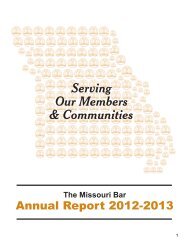Probate Law Resource Guide (PDF) - the Missouri Bar
Probate Law Resource Guide (PDF) - the Missouri Bar
Probate Law Resource Guide (PDF) - the Missouri Bar
- No tags were found...
Create successful ePaper yourself
Turn your PDF publications into a flip-book with our unique Google optimized e-Paper software.
Property can often be distributed to <strong>the</strong> beneficiaries shortly after <strong>the</strong> settlor’s<br />
death, avoiding much of <strong>the</strong> delay encountered with probate administration. Also,<br />
probate court approval is not necessary to sell an asset in a trust, thus avoiding<br />
fur<strong>the</strong>r delay.<br />
In addition to <strong>the</strong> avoidance of probate administration in <strong>Missouri</strong>, “ancillary”<br />
probate administration in o<strong>the</strong>r states where real estate is owned can be avoided<br />
by transferring <strong>the</strong> out-of-state real estate to a revocable living trust. For those<br />
owning real estate in several states, this can be a significant advantage.<br />
Real estate, businesses, and o<strong>the</strong>r assets can continue to be actively managed<br />
by a successor trustee in central administration in much <strong>the</strong> same way as a settlor<br />
would have done before <strong>the</strong> settlor died or became incapacitated. For example,<br />
a trustee can use trust assets to pay utility bills to keep <strong>the</strong> pipes from freezing,<br />
property maintenance expenses, and real estate taxes until real estate is sold or<br />
distributed. The trustee might work out property distribution issues, such as some<br />
beneficiaries wanting <strong>the</strong> real estate while o<strong>the</strong>rs want money.<br />
▼<br />
Since a revocable living trust is a more complex legal document that must be<br />
funded by changing property titles while <strong>the</strong> settlor is alive, it is more costly to<br />
establish than a will, which can have higher expenses after death. Also, accounts<br />
need to be retitled, deeds and o<strong>the</strong>r transfer documents must be prepared transferring<br />
<strong>the</strong> settlor’s assets to <strong>the</strong> trust, and beneficiary designations need to be<br />
changed to <strong>the</strong> trust— all processes which can require a substantial investment of<br />
<strong>the</strong> settlor’s time.<br />
The use of a revocable living trust requires more ongoing monitoring to ensure<br />
that assets remain in <strong>the</strong> trust and that newly-purchased assets are titled in <strong>the</strong><br />
trust. For example, a settlor who moves a certificate of deposit (perhaps to obtain<br />
a better interest rate) must remember to advise <strong>the</strong> new institution to title <strong>the</strong> new<br />
account in <strong>the</strong> trust.<br />
After <strong>the</strong> settlor’s death, some of <strong>the</strong> income tax rules applicable to a trust are<br />
not as liberal as those available to a probate estate. For example, a probate estate<br />
may elect to use a fiscal year as its tax year, while a trust is restricted to <strong>the</strong> calendar<br />
year. Trusts must pay estimated income tax payments while a probate estate<br />
is exempt from this requirement for <strong>the</strong> first two years. Trusts are also subject to<br />
o<strong>the</strong>r tax rules that do not apply to probate estates.<br />
▼<br />
What Are Some of <strong>the</strong> Disadvantages of a Revocable<br />
Living Trust<br />
Who Can Serve as Trustee<br />
If <strong>the</strong> settlor becomes physically or mentally incapacitated, property held in this<br />
trust remains available to <strong>the</strong> settlor without <strong>the</strong> requirement of a court-supervised<br />
conservatorship. The successor trustee named in <strong>the</strong> trust document takes charge<br />
to manage <strong>the</strong> assets in <strong>the</strong> trust and pay <strong>the</strong> settlor’s bills.<br />
1113


